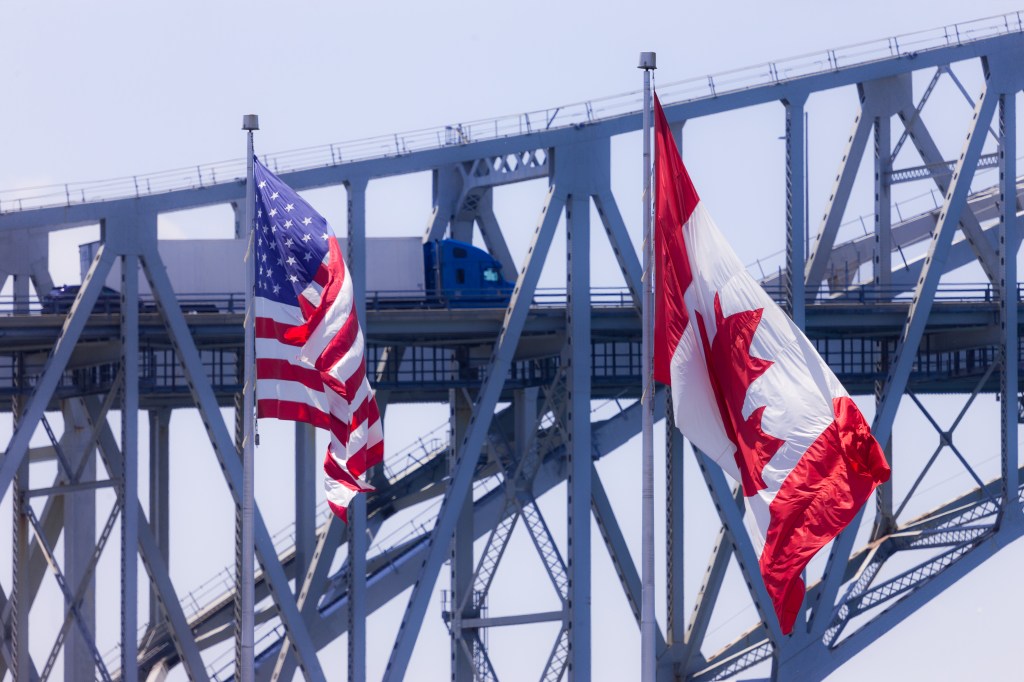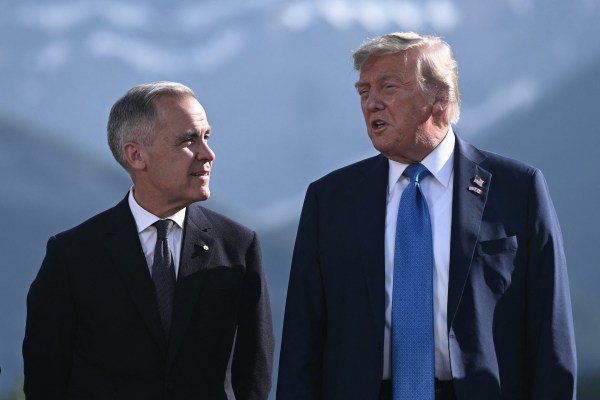It was a surprise that George Grant’s Lament for a Nation became a sensation when it was published in 1965. James Laxer, a Canadian nationalist and leftist, called it “the most important book I ever read in my life. Here was a crazy old philosopher of religion at McMaster and he woke up half our generation.” And it might be even more of a surprise that, 60 years later, a book about the fall of the Canadian government in 1963 might have something compelling to say about the world today.
John Diefenbaker, Canada’s prime minister from 1957 to 1963, was the head of that government, and it fell in large part—here is where the similarities to today begin—due to American pressure. The United States wanted to deploy nuclear missiles on Canadian territory, and Diefenbaker, after a lot of dithering, denied the request. Both the dithering and the decision created an impression that Diefenbaker was not up to the job, and soon after, the government fell in a vote of no confidence. Diefenbaker believed, and with reason, that the Kennedy administration had helped cause the fall of his government so that a missile-friendly one would replace it. And Grant agreed—but he saw deeper. As his book’s subtitle says, Grant saw the fall of Diefenbaker’s government as a sign of “the defeat of Canadian nationalism,” because Canadian nationalism lacked the political, economic, and spiritual resources to persist.
Why would a government fall because it attempted to assert its own country’s sovereignty? And why could the Kennedy administration be sure that the government that replaced Diefenbaker’s would be more pro-American and allow the nuclear missiles? Answering that second question is the inspiration for Lament for a Nation. Some of it is the obvious factor; the United States has a much bigger population and economy, shares a long land border with Canada, and speaks the same language as most of it, and so American power and influence would naturally shape Canada. But Grant saw Canada, especially its elites, as collaborators in ceding a dominant position to the United States. The integration of the Canadian economy into the American one, he argued, made Canada a branch-plant economy, with many raw materials and factories but without the ability to make decisions from the top; those decisions were—and are—made by Americans. Grant argued, then, that Canadian capitalists can never really be nationalists; if their two masters disagree, they will side with capital and the United States and not nationalism and Canada. The controversy over the extent to which Mark Carney, Canada’s prime minister and the leader of the Liberal Party, was involved in his former company’s decision to move its headquarters from Toronto to New York City shows that the issue is not dead.
The much greater threats Donald Trump has directed at Canada have led to an anti-American response stronger than Grant would have anticipated—indeed, how to respond is one of the main issues of the April 28 parliamentary election. Carney has imposed counter-tariffs and said that “deepening integration of our economies and tight security and military cooperation is over,” and the leader of the Conservatives, Pierre Poilievre, has proposed additional retaliatory tariffs, renegotiating trade agreements, and reorienting Canada’s economy away from the United States.
But the inevitable economic pain that will come with such a shift requires an answer to Grant’s real question, and the one he lamented that he had no real answer to: What does it mean to defend Canada? What are Canadians loyal to?
American politics and American media, aided by their common language with most of Canada, were, in Grant’s view, subsuming and replacing Canadian political traditions. Even Diefenbaker, the hero of Grant’s book, does not get off easy; Grant blamed him for a “confusion of populism, free enterprise, and nationalism” native to American conservatism but not Canadian. As Grant noted, in Canada, “the Conservative Party had, after all, created Ontario Hydro, [the Canadian National Railways], the Bank of Canada, and the CBC.” And the American concern with free enterprise provided Grant with an opportunity to summarize the difference between the two approaches to conservatism; American conservatives’ “concentration on freedom from governmental interference has more to do with nineteenth-century liberalism than with traditional conservatism, which asserts the right of the community to restrain freedom in the name of the common good.”
Grant considered two paths that would allow Canada to avoid being gradually subsumed into America. The first was Castroism—like Fidel Castro, establishing a socialist state and aligning with the Soviet Union for support—and while Grant was not totally averse to it, he immediately ruled it out. Canadians are not socialists, he said, and even if they were, the Americans would never allow it. (Look what they did to Diefenbaker.) The second was Gaullism—like Charles de Gaulle, using nationalism as a tool to insist to the Americans that there are limits on the alliance of the West—and he also ruled that out, saying that “Gaullism is only possible when nationalism is such a dominant motive among certain élites that they are able to control the economy so as to stop the tendency of capitalism to become international. There are no such élites in the Canada of 1965.” Perhaps there are in the Canada of 2025, if for no other reason than that the explicit threat of the United States integrating Canada has always provoked a nationalist backlash (as happened in the attempted invasions during the Revolutionary War and the War of 1812; fears of annexation helped prompt Canadian Confederation and the rejection of lowered tariffs with America in the election of 1911). But maintaining a healthy distance from America would also require economic sacrifice, and, as Grant noted in a later forward to Lament for a Nation, “[Canada] is like the child of some stockbroker who can enjoy the fruits of his father’s endeavors by living the swinging life, but likes to exclude from his mind where the money comes from.”
In the end, this is the only question: What sacrifices are worth it? And how can they be justified? This is a question not just for Canada, but for all nations forced to reconsider their relationship with the United States. And this includes not just our friends but our enemies. Denmark will have to decide what demands to annex Greenland mean, and China will have to decide the same about triple-digit tariff rates.
And yet Grant had something to say to Americans as well. If nothing else, he spoke from a conservative perspective that has very little in common with American conservatism; perhaps the only figure revered in American conservatism with much in common with him at all is John Adams. Grant became a nationalist not out of any real affection for nationalism—he was too much of a Christian and a Platonist for that—but because it was a defense against the technological capitalism and liberalism he saw in the United States, whose end result would be a society concerned only with consumption and not with virtue. He despised both abortion and the Vietnam War while being unimpressed with the student movements against the latter. He had little use for Locke and was sympathetic to socialism. America does not produce conservatives like this, because there is no conservative tradition in America like this—and it would be hard to imagine one, since the thing American conservatism has historically sought to conserve is a nation founded in revolution on Lockean principles. (Grant has a great affection for the Loyalists who left America for Canada after the Revolution.) His view of America was that of someone very close to it—we have many similarities with Canadians—and yet completely alienated by it.
And that alienation allowed him to write this frankly horrifying footnote in 1965:
The next wave of American “conservatism” is not likely to base its appeal on such unsuccessful slogans as the Constitution and free enterprise. Its leader will not be a gentleman who truly cares about his country’s past. It will concentrate directly on such questions as “order in the streets” which are likely to become crucial in the years ahead. The battle will be between democratic tyrants and the authoritarians of the right. If the past is a teacher to the present, it surely says that democratic Caesarism is likely to be successful.
These statements could only be improved by noting that the same man could pose, depending on the moment, as the democratic tyrant or the authoritarian of the right and have all the advantages of both. Grant’s fears have come true, and his complaints about America and its ideology have been justified. And he wanted Canada to develop a national identity so that it could avoid the slow amalgamation into the America he saw coming.
And, now that that America is here, the question Grant asked Canada—how can we avoid this?—is a question the United States has to ask itself. If anything, Canada found itself in a better position—America is foreign, and so in addition to the cheap and empty calories of nationalism, Canada could draw on existing traditions and ideas opposed to America (however atrophied Grant found them at the time). America has no such resources; just as a factual matter, the whole of American history resulted in the present situation. We are not being attacked by outsiders; we did all of this to ourselves. And if, like Grant, we want to attribute it not to the American people (whom he never blames, if for no other reason that Americans do not think about Canada nearly as much as vice versa) but to American politics, American economics, American society—who empowered the politicians, who makes up the economy and the society? And if we hope to find the resources in an imagined past, that too is useless; the past was once real, and from there we ended up here. It is hard to imagine that Grant thought many Americans would read his complaint about the fall of a Canadian government, but the question simmering about America underneath every page is: Is this all you are?
At the end of the book, Grant collapsed into a sort of pessimism. Canada is a small and, compared to its neighbor, a backward nation; America is the vanguard of “human progress”; therefore Canada’s disappearance is probably inevitable and, from a certain perspective, maybe it would even be good. He fought the good fight, and he clung to things more important and more lasting than Canada or any nation—God, the Form of the Good, and his church—but one philosopher is no match for historical trends. And yet he warned that “lamentation falls easily into the vice of self-pity. To live with courage is a virtue, whatever one may think of the dominant assumptions of one’s age.” And that injunction is universal, not just for Canadians. What form that courage will take is impossible to say. But we have no choice but to live with courage—however much hinged on Canada in 1965, far more hinges on America now. Our president seems intent on justifying all of the worst things Grant ever said about the United States. Howard Green, Diefenbaker’s minister of external affairs, said in 1963 that “when you are the biggest fellow in the school yard it is quite a temptation to shove everybody else around. Now, I am confident that there will be no such development in United States policy.” He was wrong then and even more wrong now, but to prove him right and make Grant relieved to be wrong will require courage. Amoral acquisitiveness and schoolyard bullying are frequently the way of the world. It will be hard to change that, in ourselves as in our country, but courage has never been about what is easy. Again, Grant, without meaning to, seems to be asking Americans: Is this all you are? I hope not.







Please note that we at The Dispatch hold ourselves, our work, and our commenters to a higher standard than other places on the internet. We welcome comments that foster genuine debate or discussion—including comments critical of us or our work—but responses that include ad hominem attacks on fellow Dispatch members or are intended to stoke fear and anger may be moderated.
With your membership, you only have the ability to comment on The Morning Dispatch articles. Consider upgrading to join the conversation everywhere.